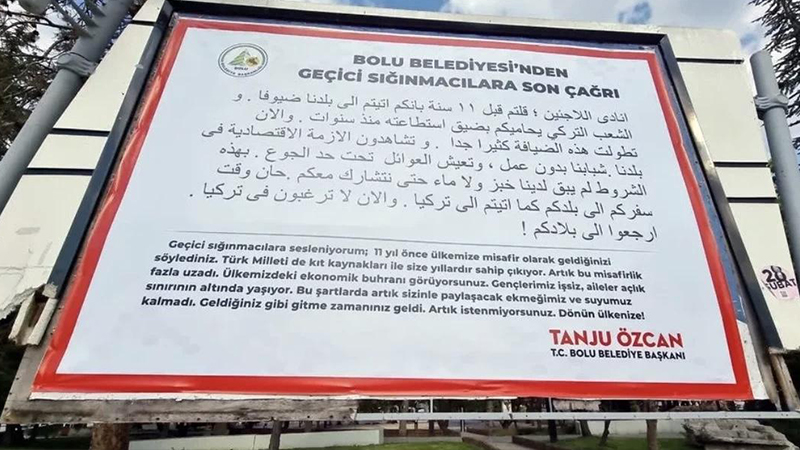Billboards telling Syrian refugees in Arabic to return to their homeland since they’re no longer wanted in Turkey were put up in the northwestern city of Bolu upon the order of the mayor, who is notorious for his anti-refugee policies, local media reported on Wednesday.
Bolu Mayor Tanju Özcan from the main opposition Republican People’s Party (CHP) on Wednesday shared a photo of the billboards with anti-refugee statements on his social media account, saying, “We have written and spoken [about this] in Turkish many times. They didn’t understand it. We’ve [now] written it in a language that both the government and the invaders understand. Enough is enough!!!”
Türkçe defalarca yazdık söyledik. Anlamadılar. Bizde hem iktidarın hem istilacıların anlayacağı dilden yazdık. Yeter Artık !!! pic.twitter.com/7xOt2W33NR
— Tanju ÖZCAN (@tanjuozcanchp) May 18, 2022
The mayor’s message on the billboards, which was written in both Arabic and Turkish, reads: “I’m calling on temporary asylum seekers: 11 years ago, you came to our country as guests. The Turkish nation has been protecting you for years with its scarce resources. You’ve overstayed your welcome. You see the economic depression in our country. Our youth are unemployed, families live below the poverty line. Under these conditions, we have no more bread and water to share with you. It’s time for you to go as you came. You are no longer wanted, return to your country.”
Özcan’s move was the latest in a series of controversial measures he has introduced as part of anti-refugee policies in Bolu to convince refugees to leave the city.
The mayor frequently sparks criticism from human rights groups due to his remarks and measures targeting the refugees living in the city such as imposing exorbitant fees for municipal services on them.
According to a report by the Demirören News Agency (DHA) on Thursday, the Human Rights and Equality Institution of Turkey (TİHEK), a governmental organization responsible for the protection and promotion of human rights, imposed a TL 40,000 ($2,505) administrative fine on the Bolu Municipality for “violation of the prohibition of discrimination.”
The decision was made after the institution launched an investigation into the municipality regarding measures such as imposing exorbitant fees on foreigners for using water and applying for a marriage license.
The Bolu Chief Public Prosecutor’s Office also launched an investigation into Özcan for “misconduct” and “hatred and discrimination” after he said in July 2021 that additional water and solid waste tax 10 times the normal tax would be imposed on migrants in Bolu.
Although the Bolu City Council in November approved a proposal imposing exorbitant fees on foreigners to access public services and obtain a marriage license in an attempt to deter them from settling there, an administrative court in Bolu province imposed an injunction on the implementation of the measures in January.
When he was first elected as mayor of Bolu in 2019, Özcan’s first act was to cut municipal aid to Syrian refugees in the city as he had promised during his election campaign.
Anti-immigrant sentiment has reached a boiling point in Turkey, fueled by the country’s economic woes. With unemployment high and the price of food and housing skyrocketing, many Turks have turned their frustration toward refugees, particularly the nearly 4 million Syrians who fled the civil war that broke out in 2011.
Attitudes about refugees fleeing the long conflict in Syria have gradually hardened in Turkey, where they used to be welcomed with open arms, sympathy and compassion, as the number of newcomers has swelled over the past decade.
Tensions between Turks and Syrians flare up on occasion in Turkey, where refugees are blamed for many of the country’s social and economic ills.
Hate crimes against refugees and migrants have been escalating in recent years as Turkish media, including pro-government and opposition outlets, fuel and exploit the flames of hatred against people who fled their countries and sought refuge in Turkey.
Anti-migrant sentiment has also been expressed by opposition politicians, including Ümit Özdağ, leader of the far-right and anti-refugee Victory Party (ZP), and CHP leader Kemal Kılıçdaroğlu, who promised to send Syrians back home if his party comes to power in 2023.
Although President Recep Tayyip Erdoğan had said early in May that his government was aiming to encourage 1 million refugees to return home by building housing and local infrastructure in Syria, he also pledged on May 9 that Turkey would not drive them back to their home country despite pressure from opposition parties.
Erdoğan is facing rising public anger over the refugees and is wary of the issue dominating next year’s presidential elections.



